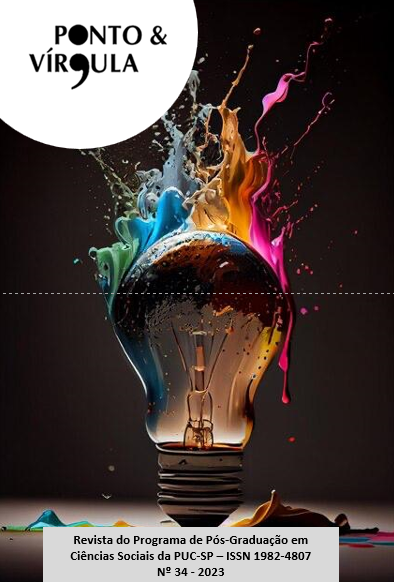ITINERÂNCIAS SOBRE A NOSSA RELAÇÃO COM A ESCRITA: RELATOS E EXPERIÊNCIAS
Palavras-chave:
Escrita; , Processo Sensorial; , Criatividade; , Legado Cultural; , Transformação.Resumo
Este artigo, resultado de observações realizadas no contexto de uma pesquisa itinerante, explora a escrita como um processo transformador e sensorial, comparando-a ao trabalho do oleiro que molda o barro. A partir de uma experiência vivida em olarias, a reflexão se expande para mostrar como a escrita, assim como o artesanato, envolve os sentidos e a criatividade, conectando o passado ao presente. Ao estabelecer paralelos com figuras como Anne Frank, cujo diário se tornou um símbolo de resistência, e Vincent Van Gogh, que usava as cartas como forma de expressar suas emoções mais profundas, o texto discute o papel da escrita na construção de legados culturais e afetivos. Autores como Paulo Freire e Merleau-Ponty ajudam a fundamentar a visão da escrita como uma prática de expressão que vai além do registro histórico, sendo uma maneira de moldar ideias, sentimentos e narrativas. A mensagem final destaca o impacto duradouro da escrita, que, assim como as obras de arte e as criações manuais, transcende o tempo e transforma tanto o escritor quanto o leitor, deixando um legado que ecoa para as futuras gerações.
Referências
BACCEGA, Maria Aparecida. Apresentação. In: CINTRA, A. M. et al. Para entender as linguagens documentárias. 2. ed. São Paulo: Polis, 2002.
BARTHES, Roland. O prazer do texto. São Paulo: Perspectiva, 1984.
BECKER, Howard S. Truques da escrita: para começar e terminar teses, livros e artigos. Trad. Denise Bottmann. Rio de Janeiro: Zahar, 2015.
BRONCKART, Jean-Paul. Atividade de linguagem, textos e discursos: por um interacionismo sócio-discursivo. São Paulo: EdUC, 1999.
CAVAJAL PÉREZ, F.; RAMOS GARCÍA, J. Ensinar ou aprender a ler e a escrever? Trad. Cláudia Schilling. Porto Alegre: Artmed, 2001.
DAMIAO, Sandra; SACRISTÁN, Julián. Escrita e reflexão: uma abordagem crítica. São Paulo: Cortez, 2005.
FOUCAULT, Michel. O que é um autor? In: ______. Ditos e escritos, III: Estética: Literatura e Pintura, Música e Cinema. Rio de Janeiro: Forense Universitária, 2001. p. 264-298.
FRANK, Anne. O diário de Anne Frank. 69. ed. Rio de Janeiro: BestBolso, 2019.
FREIRE, Paulo. Pedagogia da Autonomia: Saberes necessários à prática educativa. São Paulo: Paz e Terra, 1996.
HABERMAS, Jürgen. Théorie de l’Agir Communicationnel : Rationalité de l’Agir et Rationalisation de la Société. v. 1. Paris: Fayard, 1987.
LE COADIC, Yves-François. A ciência da informação. 2. ed. Brasília: Briquet de Lemos, 2004.
LARROSA, Jorge. Notas sobre a experiência e o saber de experiência. Revista Brasileira de Educação, n. 19, p. 20-28, 2002.
LUHMANN, Niklas. Sistemas Sociais: Lineamentos para uma Teoria Geral. Barcelona: Anthropos, 1998.
MEIRA, Ana C. S. A escrita: a voz do ausente. Revista de Estudos Psicanalíticos, São Paulo, SP, dez. 2016. Disponível em: http://www.spbsb.org.br/site/images/Novo_Alter/2014_2015_2016/A_escrita_voz.pdf. Acesso em: 01 set. 2024.
SILVA, Marília Zampieri; GOTO, Tommy Akira. Aportes de uma psicologia fenomenológica da dor e do sofrimento. In: FEIJOO, A.; LESSA, P. (Orgs.). Fenomenologia e práticas clínicas II. Rio de Janeiro: IFEN, 2017.
VAN GOGH, Theo. Cronologia. In: VAN GOGH, Vincent. Cartas a Théo. Porto Alegre: L&M, 2002. 420 p.
VAN GOGH, Vincent. Cartas a Théo. Porto Alegre: L&M, 2002. 420 p.
VYGOTSKY, Lev S. A formação social da mente: o desenvolvimento dos processos psicológicos superiores. São Paulo: Martins Fontes, 2000.
Downloads
Publicado
Como Citar
Edição
Seção
Licença
Copyright (c) 2024 Ponto-e-Vírgula

Este trabalho está licenciado sob uma licença Creative Commons Attribution 4.0 International License.

Este obra está licenciado com uma Licença Creative Commons Atribuição 4.0 Internacional.





